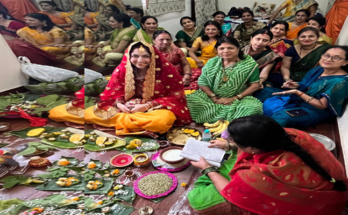 India has distinct social, religious, language, and regional categories. However, Indian civilisation is not a sum of distinctiveness; it is an evolution of contributions in the processes of interaction, adoption, acculturation, and assimilation on the one hand and upholding distinctiveness on the other. This requires an appreciation of Indian civilisation in distinctiveness and perceiving a panoramic vista across distinct categories. This sense gives rise to the idea of pluralistic India. In recent years, pluralistic ideas have been perceived with prominence given to recognising distinct categories within a national territorial space while keeping aside the idea of a shared whole that evolved across these categories in the past. This divisive sense is grossly reflected on the occasion of the inauguration of the New Parliament.
India has distinct social, religious, language, and regional categories. However, Indian civilisation is not a sum of distinctiveness; it is an evolution of contributions in the processes of interaction, adoption, acculturation, and assimilation on the one hand and upholding distinctiveness on the other. This requires an appreciation of Indian civilisation in distinctiveness and perceiving a panoramic vista across distinct categories. This sense gives rise to the idea of pluralistic India. In recent years, pluralistic ideas have been perceived with prominence given to recognising distinct categories within a national territorial space while keeping aside the idea of a shared whole that evolved across these categories in the past. This divisive sense is grossly reflected on the occasion of the inauguration of the New Parliament.
Being a common citizen, I am disturbed by some political remarks hurled at the inauguration of the New Parliament Building. If words reflect one’s mind, what is in our politicians’ minds who lead people to serve the nation? Boycott of the inauguration function amounts to some opposition parties’ non-acceptance of the New Parliament House. As the ruling party declares it, the coming session of the Parliament will be held in the new house. Will the opposing parties attend the session? The New Parliament will house the departments run in rented buildings for which vast amounts of money are paid from the exchequer as rent. Is not it in the interest of the nation? The old building is a legacy of colonial administration. Is it not patriotic to cast off colonial legacy one by one after India became free?
I do not know why the President was not invited or why the Prime Minister did the inauguration, and what the norm is that is violated. The President is the head of the legislature, executive, judiciary and three army wings. Is there any convention that the head of the state will inaugurate all the buildings? If so extended, the President would inaugurate the old Parliament building or library. Is there not any distinction between the head of the government and the head of the state? Every head has its functional jurisdiction despite being a part of a greater umbrella. Is it, not decentralised sense?
In Manipur, Tamil Nadu and Bihar, there are instances of the inauguration of assembly buildings by persons other than the Governor, who holds the same position and status in the state as the President of the country. Ignoring this convention and stressing the inauguration by the President is nothing but a misguiding stint. In the media, it is suggested that the inauguration by the PM is an insult to the President, so the only alternative is to resign. Who feels insulted, the President or the media person? What low level of impression does it leave in the public mind? Is this the way a President of the country shall be advised to behave by low wit persons? Is not it demeaning the greatness of the post of President?
But the crux of the problem is more appalling. Some politicians point out the President’s non-inauguration as disrespect to Adivasis and women. Is Her Excellency the President of a women’s group or adivasi people? Or is Her Excellency the President of the country of diverse social and religious groups? Such remarks expose the littleness of politicians who do not understand the essence of a post. However, the problem is that some followers believe in the words and ideas of such politicians. Such remarks are not in the interest of a pluralistic country that evolved from ancient times.
Nitish Kumar criticises the inauguration by the PM as an attempt to change history. If history will not change, then how can new history be created? Change is life. Living with a humiliating past is like death. With new history, it means that we are alive. Is Nitish Kumar ignorant about it? Or does he want to lead his people to a static life without any progress?
There is doubt about the historicity of the Sengol. What’s about the attestation by Vumiddi Bangaru Chetty family and Adheenan seers who made it? There is Sengol, and it is a display in Allahabad Museum. What is the history or records available on its make, placement in the museum and the purpose for which it was made? Are these queries not investigated in history? What was the history behind Tamil inscriptions in it and displaying it as a walking stick? Are there records to answer such queries? In the absence of records, can we disown the existence of the Sengol? Oral narrative, if the narrating person is a witness or learnt the event from one who was the witness, is a source of history rejecting the exclusive claim of written or archaeological evidence as the only source. Here is the authentication from the persons involved in the make and the purpose for which it was made. Will not questioning the history of Sengol amount to questioning the historical research methods? There is also doubt about the historicity of the power transfer in the absence of records. Is there any record of how power was transferred when a new king, maybe the son, was formally coronated and assumed power? With the invasion and forceful occupation of a kingdom, the coronation was not a normal ritual. Maybe the practice stopped with Muslim invasions, colonial occupations, and the conversion of kingdoms into protectorates. To question the tradition by citing particular limitations of history is like questioning the sunshine outside by closing eyes or staying in a closed room.
Jairam Ramesh, a stalwart politician and an intellectual, criticizes the ceremony of handing over the Sengol as a sign of the return to monarchy. Have we discarded all the aspects of the governance of monarchical days in democracy? Are not people ruled by rulers, though the people elect them? Is not the protocol claim about the inauguration by the President the status question that also prevailed during the monarchy? In a democracy, there is also a procedure by which power is transferred from the old government to the new government. This transfer of power is not unique to monarchy alone. It is stated that Sengol was used as a symbol of the transfer of power from the British to the Indians. Installation of Sengol in the Parliament is simply a recognition of that transfer. The occasion does not mark a transfer through inheritance or discarding the democratic system of electing a government.
Swami Prasad Mayurya’s question on the occasion of the inauguration is not only ridiculous and illogical but also repulsive. He questions why Brahmins are from the South. Why not priests from all religious communities? What is essential for him to is not clear. When inauguration is objected what does it mean how it is done? Some persons have an interest or are very much attached to something, though they object to it. But they cannot ignore its absence in life. Such persons watch the object or event from a distance and show disgust at not having it by criticising this or that aspect.
An average man considers a Brahmin as a Brahmin. It does not matter the place where the Brahmin comes from if he is an expert for the purpose. The divisive mind has no stop. Such minds that can divide between south and north may also seek divisions based on villages. The regional division is not a healthy sign for the spirit of national integration when a quality stands undifferentiated across the regions. Such thinking is a reflection of a low mentality or ignorance, and such leaders are miles away from understanding the idea of a nation. The next question is more queering that the- Transfer of power and rituals associated with it in India is an intrinsic characteristic of Hindu tradition. Besides, the inauguration of a house by performing Vedic rituals, the belief around it and the use of Vastu shastra rules while building a house are embodied in Hindu tradition. How come, other priests are suitable for the purpose? His argument is like replacing a tailor master with a schoolmaster, music master, or karate master, for the master title goes with all of them! The irony is that these leaders claim to lead people for their progress and the progress of the nation. How can they do so when they see the country in divisions and propagate divisive ideas?
How can a man be qualified to be a public leader for the betterment of the nation when he divides the public into different compartments? It is time for the public to fight against the ignorance and low mentality of their leaders. In a democracy, the opposition is a strong force to prevent derailment of the government from public interest. Who does work or who does not may have protocol questions, but all the opposition’s attention on it does not solve the problem of the public. Does not it indicate that oppositions do not correctly understand public interest?
(Written by Professor M.C.Behera, Rajiv Gandhi University, email: mcbehera1959@gmail.com)



